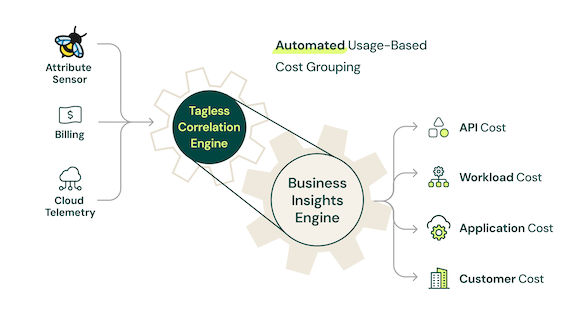As organizations increasingly leverage cloud resources, managing cloud costs has become a top priority. However, traditional cloud cost allocation methods often rely on tagging. A method that was invented 15 years ago and does not meet the current complexity of the cloud, it is error-prone, and hard to enforce across dynamic environments. Enter eBPF, a revolutionary technology at the heart of our FinOps platform, enabling organizations to achieve unparalleled cloud cost visibility and allocation, which is also automatic and dynamic.
What is eBPF?
eBPF (Extended Berkeley Packet Filter) is a powerful Linux kernel technology that allows programs to run safely in the kernel space without modifying its source code. Initially designed for packet filtering, eBPF has evolved into a versatile tool that can monitor, trace, and analyze system events at a granular level. Its ability to observe kernel-level activities in real-time makes it a perfect fit for understanding complex system interactions.

How We Leverage eBPF in Attribute Solution
Our platform uses eBPF as a safe, lightweight sensor to gain deep insights into cloud usage. Here’s how it works:
- Fine-Grained Observability:
eBPF enables us to monitor system calls, network traffic, and application behavior in real-time, revealing how cloud services are used. This goes beyond basic metrics like CPU or memory usage, capturing which entities (e.g., teams, customers, or business units) are using specific resources. - Tagless Resource Tracking:
Unlike traditional tagging methods, eBPF observes usage patterns directly from the kernel. This allows us to discover how workloads are used for service delivery, and align it to business metrics such as customer activity, team contributions, or product usage, without requiring manual tagging or any configurations. - Dynamic and Scalable Monitoring:
As cloud environments are highly dynamic, eBPF adapts to changes effortlessly, ensuring easy, accurate monitoring of ephemeral workloads like containers, and virtual machines. This scalability is critical for large organizations with constantly shifting infrastructure. - Data-Driven Cost Allocation:
By correlating the granular data collected by eBPF with business metrics, our platform helps to communicate costs and deliver relevant insights for each stakeholder, fostering collaboration with actionable insights over cloud spending. Organizations gain trust in how costs are allocated by an automated system, consistent, precise, ensuring accountability and enabling smarter financial decisions.
Why eBPF Matters for FinOps
eBPF reveals new data, previously unused, for FinOps. New data helps to build trust and communicate costs easily thanks to its granular level, and save time/level up from tagging which is transformative. By leveraging eBPF, our platform empowers organizations to:
- Align cloud spending with business outcomes.
- Foster collaboration between engineering, finance, and business teams.
- Reveal the application context of consumption to locate inefficiencies.
eBPF is not just a technology—it’s a paradigm shift in how we monitor, understand, and manage complex systems. With Attribute’s platform, we’re leveraging its full potential to help businesses unlock true cloud cost efficiency and transparency.

